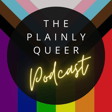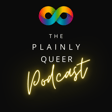
Language and Its Power in the LGBTQ+ Community
Welcome to the inaugural episode of The Plainly Queer Podcast; we explore the immense power of language in shaping our experiences and understanding of the world. We discuss the importance of inclusive language within the LGBTQ+ community, the impact it has on breaking stereotypes, and how it can foster empathy and connection.
Join us as we delve into the ways in which inclusive language can create more diverse and equitable spaces, where everyone feels valued and respected.
Online or In-person Therapies: Insight Matters - a fantastic resource providing Queer affirming online and in-person therapeutic support. Visit www.insightmatters.ie for more information.
LGBTQ+ community support in Ireland: https://lgbt.ie/
LGBTQ+ Youth Support in Ireland: https://www.belongto.org/
Transgender Equality Network Ireland: https://teni.ie/
Phone Help Lines:
- Samaritans: 24-hour service – freephone 116 123, www.dublinsamaritans.ie
- Childline: 24-hour service – 1800 66 66 66, www.childline.ie
- Teenline: 8 pm-midnight – 1800 833 634, www.teenline.ie
- Aware (Depression): 1890 303 302, www.aware.ie
- Pieta House (Self-Harm/Suicide Support): 01-6010000, www.pieta.ie
- Bodywhys (Eating Disorders): 1890 200 444, www.bodywhys.ie
- Console (Suicide Bereavement Support): 1800 247 247, www.console.ie
- Grow (Mental Health Support Groups): 1890 474 474, www.grow.ie
- Alcoholics Anonymous: www.alcoholicsanonymous.ie
- Drugs/HIV Helpline: 1800 459 459 www.hse.ie/drugshivhelpline
- Rape Crisis Network Ireland: 24-hour helpline 1800 77 88 88 www.rapecrisishelp.ie
Crisis Text Line: Text HELLO to 50808 to connect with a crisis counsellor who can provide support and help connect you to further resources.
Remember, you're not alone, and there are resources and people who want to help. So please reach out if you're in need.


